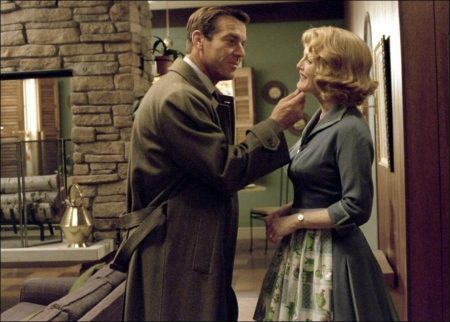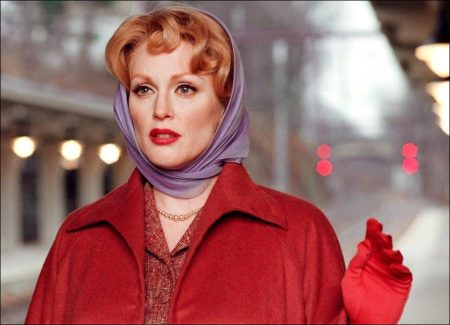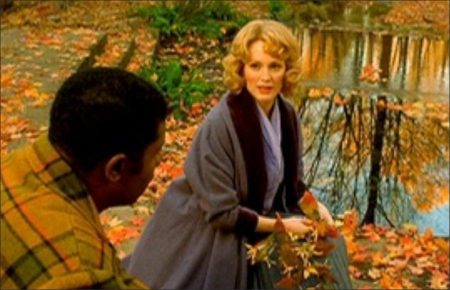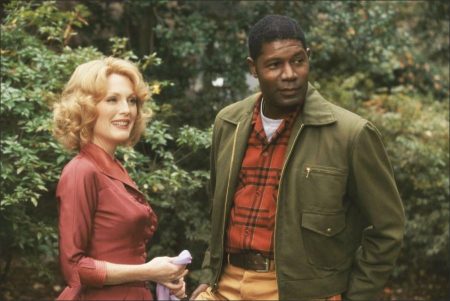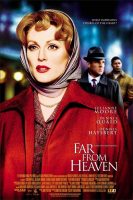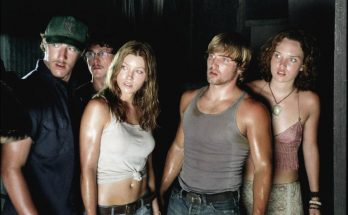Taglines: It’s time to stop hiding from the truth.
Cathy is the perfect 50s housewife, living the perfect 50s life: healthy kids, successful husband, social prominence. Then one night she stumbles in on her husband Frank, kissing another man, and her tidy world starts spinning out of control. In her confusion and grief, she finds consolation in the friendship of their African-American gardener, Raymond – a socially taboo relationship that leads to the further disintegration of life as she knew it. Despite Cathy and Frank’s struggle to keep their marriage afloat, the reality of his homosexuality and her feelings for Raymond open a painful, if more honest, chapter in their lives.
Far from Heaven is a 2002 American drama film written and directed by Todd Haynes, and starring Julianne Moore, Dennis Quaid, Dennis Haysbert and Patricia Clarkson. It premiered at the Venice Film Festival, where Moore won the Volpi Cup for Best Actress and cinematographer Edward Lachman won a prize for Outstanding Individual Contribution.
The film tells the story of Cathy Whitaker, a 1950s housewife, living in wealthy suburban Connecticut as she sees her seemingly perfect life begin to fall apart. Haynes pays homage to the films of Douglas Sirk (especially 1955’s All That Heaven Allows and 1959’s Imitation of Life) and explores race, gender roles, sexual orientation and class in the context of 1950s America.
Far From Heaven focuses on several controversial issues of the mid-twentieth century, including Racism, Miscegenation, as well as views on Homosexuality, and the stigma of Escapism during that time period, presenting these issues through the Mise-en-scène and cinematographic conventions of a 1950s style Melodrama.
Utilizing the nostalgic mechanisms of a polished melodrama, Far From Heaven challenges the typical sanguine nature of the genre in an effort to highlight the central conflicts of its main characters, Cathy and Frank Whitaker, while also simultaneously shattering the wholesome image of American life during this time period, which is typically looked back upon fondly in American culture.
Todd Haynes, the director of Far From Heaven, employs these tactics and others such as lighting and music to highlight these pivotal developments, and to further not only the plot of the story, but to create a sensory experience for the audience that lulls them into what appears to portray an idealized version of 1950s suburban American family life, but proves to be far from it.
About the Story
In 1957 suburban Connecticut, Cathy Whitaker appears to be the perfect wife, mother, and homemaker. Cathy is married to Frank, a successful executive at Magnatech, a company selling television advertising. One evening Cathy receives a phone call from the local police who are holding her husband. He says it’s all a mix up but they won’t let him leave alone. Frank has in fact been exploring the underground world of gay bars in Hartford, Connecticut. One day, Cathy spies an unknown black man walking through her yard. He turns out to be Raymond Deagan, the son of Cathy’s late gardener.
Frank often finds himself forced to stay late at the office, swamped with work. One night when Frank is working late, Cathy decides to bring his dinner to him at the office. She walks in on him passionately kissing another man. Frank confesses having had “problems” as a young man, and agrees to sign up for conversion therapy. However, his relationship with Cathy is irreparably strained, and he turns to alcohol.
Cathy runs into Raymond at a local art show, and initiates a discussion with him about modern painting, to the consternation of a few onlookers. One night, after a party, Frank attempts to make love to Cathy. He is unable to become aroused and strikes Cathy when she tries to console him.
Cathy decides to spend a day with Raymond. They go to a bar in the black neighborhood in which she is the only white person present. Raymond toasts her with a drink saying “Here’s to being the only one”. They are seen together by one of Cathy’s neighbors, who immediately tells everyone. The town is soon ablaze with gossip about the two of them. This becomes evident when Cathy attends a ballet performance by her young daughter and the mothers of the other girls prevent them from socializing with Cathy’s daughter. Cathy’s husband is also furious. Cathy goes to find Raymond to tell them that their friendship isn’t “plausible.”
Over the Christmas and New Year’s holidays, Cathy goes on a vacation with her husband to Miami to take their minds off of things. At the hotel, Frank has another sexual encounter with a young man. Back in Hartford, three white boys taunt and assault Raymond’s daughter, Sarah. Frank tells Cathy that he has found a man who loves him and wants to be with him and seeks a divorce from Cathy. When Cathy eventually finds out that the victim of the attack was Raymond’s daughter, Sarah, she goes to the Deagan home to find them packing up in preparation to move to Baltimore. Ever since the incident, he’s been getting rocks thrown in his windows, as the African American community is not taking the mixing well.
Far from Heaven (2002)
Directed by: Todd Haynes
Starring: Julianne Moore, Dennis Quaid, Dennis Haysbert, Patricia Clarkson, Viola Davis, James Rebhorn, Bette Henritze, Lindsay Andretta, Jordan Puryear, Cella Weston
Screenplay by: Todd Haynes
Production Design by: Mark Friedberg
Cinematography by: Edward Lachman
Film Editing by; James Lyons
Costume Design by: Sandy Powell
Set Decoration by: Ellen Christiansen, Sandy Powell
Art Direction by: Peter Rogness
Makeup Department: Eva Polywka
Music by: Elmer Bernstein
MPAA Rating: PG-13 for mature thematic elements, sexual content, brief violence and language.
Distributed by: Focus Features
Release Date: November 8, 2002
Visits: 58
